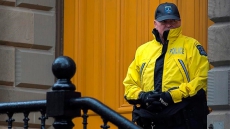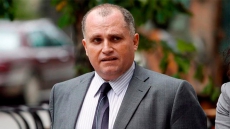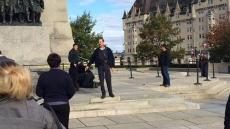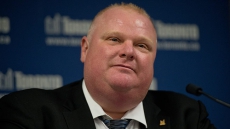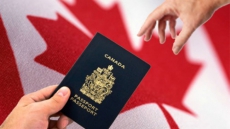MONTREAL — A psychiatrist hired by the Crown cast doubt Wednesday on Luka Rocco Magnotta's defence that he was not criminally responsible the night he killed Jun Lin.
Magnotta was sane and aware of his actions when he killed and dismembered Lin in May 2012, Dr. Gilles Chamberland testified.
Chamberland, the Crown's main rebuttal witness, consulted expert reports prepared for the defence that said the accused was psychotic and not able to tell right from wrong
He told Magnotta's first-degree murder trial there was enough in the reports to show the accused knew what he was doing.
The native of Scarborough, Ont., has admitted to killing the Chinese engineering student, but has pleaded not guilty by way of mental disorder.
Chamberland has previously said Magnotta refused to meet him for the prosecution report, which meant he couldn't say his own findings were definitive.
"It still seems very possible that the sane part of the gentleman, which was in touch with reality at the time of the acts, was amply sufficient to enable him to appreciate the nature of his acts and to know those actions were wrong," he wrote in his nine-page report.
Chamberland also said a person with mental disorder does not necessarily meet the criteria for a mental disorder defence outlined in Sec. 16 of the Criminal Code.
He also expressed doubt as to whether Magnotta actually suffered from schizophrenia.
"For me, there's nothing conclusive," Chamberland testified, adding such a diagnosis requires a long observation. He said he believes many of his previous hospitalizations for psychosis were caused by drug use — notably cocaine.
During Magnotta's initial hospital visit in April 2001, doctors were not sure what they were dealing with and no firm diagnosis had been made. They thought Magnotta might be faking symptoms but were unsure why.
Two months later, as he applied for an Ontario government welfare supplement, Magnotta submitted a handwritten form describing specific symptoms related to schizophrenia such as hearing voices.
And in August 2001, while hospitalized for a drug overdose, the schizophrenia diagnosis appeared. In March 2002 he was diagnosed as having "chronic schizophrenia."
"I'm not saying Mr. Magnotta wasn't suffering, but Mr. Magnotta also said he was consuming cocaine at the time, which could clearly explain his symptoms," Chamberland said.
Magnotta himself told a Montreal psychiatrist he saw in April 2012 that many of his previous hospitalizations had been for episodes triggered by cocaine use. That psychiatrist had also ruled out schizophrenia or bipolar disorder.
Chamberland said one of the medical dossiers even mentions that Magnotta's immediate family raised concerns he was mimicking symptoms exhibited by his father, who has schizophrenia and is estranged from the family. An aunt suggested it was just his way of seeking attention.
The Crown expert also said Magnotta's obsession with his physical appearance and looks flies against the usual symptoms exhibited by schizophrenic patients, who tend to neglect their appearance.
Chamberland returns to the stand Thursday.
